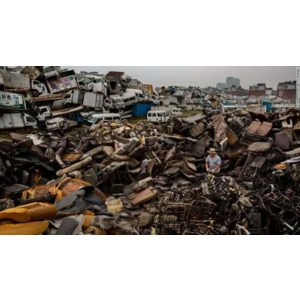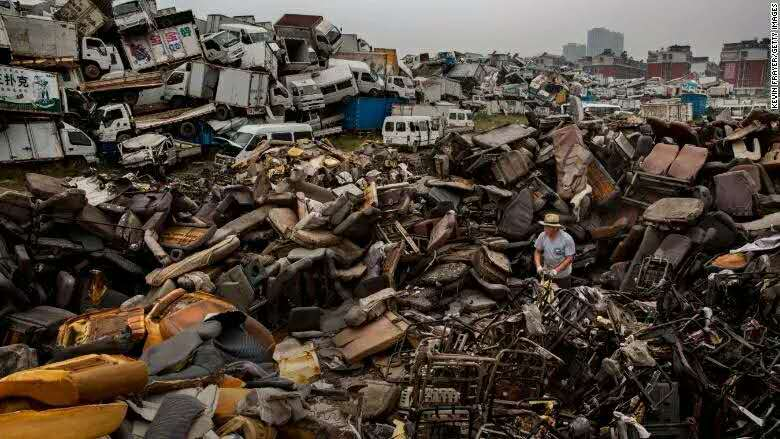



Japan's Kyodo news agency recently published a report titled "China's garbage import ban triggers global waste disposal chaos." Since China banned the import of plastic waste in January this year, Europe, the United States and Japan, which are the source of exports, are struggling to find recipients, the report said. Rubbish with nowhere to go is piling up in countries and chaos is spreading around the globe. At a WTO meeting in October this year, there was criticism that "sudden policy changes could contribute to the deterioration of the world environment". The impact of China's ban is also being felt in Japan, the report said: garbage handlers have been flooded with commissions, but many have reached the limits of their capacity to handle waste, with some from factories filling middlemen's warehouses, and the only way to respond is to relax restrictions and upgrade the capacity of processing facilities.
The United States and the European Union have raised the so-called "issue" with the WTO, while South Korea, Canada and Australia have joined the "critics" and Japan has also expressed "concern." They criticized China for not giving enough information about the ban. "Continued disruption of the world's recycling system will accelerate the increase in Marine debris," the US said. Europe and the United States and other countries are planning to Southeast Asian countries and India as new waste recipients, in order to increase waste exports. However, in October, a large amount of garbage was found to be illegally discarded in Malaysia. Vietnam, Malaysia and other countries have also begun to strengthen the import control of resource garbage. The export destination of resource garbage in Europe, America and Japan is expected to further decrease.
China used to be the world's largest importer of resource waste. Since 1988, China has received about half of the world's waste each year, including more than 7 million tons of plastic waste each year worth billions of dollars, according to United Nations statistics. Nearly half of the plastic waste on Earth is exported to China, where recycled materials are then turned into more plastic products. Over the past 30 years, the United States has shipped more than 10 million tons of plastic waste to China, with 1.43 million tons worth about $495 million exported to China in 2016 alone. According to the Guardian, 2.7m tonnes of plastic waste from the UK goes to China every year, accounting for two-thirds of the country's plastic waste. Eighty-seven percent of recycled plastic exported from the 27 EU member states is directly or indirectly exported to China. China imports 619,000 tonnes of Australian recycled materials worth US $523 million a year, most of which comes ashore at China's Hong Kong port and is then shipped to waste disposal stations in southern China.
China imports foreign waste, which has made a great contribution to the cleanliness of the world environment. However, while China has gained some economic benefits, it has also paid a price at the expense of the environment. Some of this foreign waste is not only imported legally, but also recycled by illegal waste disposal workshops. These workshops often incinerate or dispose of waste without any use, causing great pollution to the environment. In addition, recyclable solid waste is often mixed with a lot of highly polluting waste and hazardous waste. In order to maximize the use of raw materials, recycling agencies employ a large number of people to sort them by hand, and pollution from hazardous substances can cause physical harm to sorting workers.
Some analysts believe that the import of foreign waste is a temporary measure taken by China in the initial stage of manufacturing industry in order to accumulate primitive capital and rapidly improve people's living standards. With the continuous enhancement of China's industrial strength, the gradual stability of the raw material market, the gradual upgrading of the manufacturing industry, and the improvement of people's requirements for the standard of living health, foreign waste will eventually withdraw from the stage of history.
In order to protect the environment and people's health, China has decided to conserve energy and reduce emissions. In July 2017, China formally notified the WTO that 24 types of foreign waste, including 8 types of plastic waste from domestic sources, 1 type of unsorted waste paper, 11 types of textile waste and 4 types of vanadium slag, will be banned from import in January 2018. By the end of 2017, China will ban the import of solid waste, which is highly harmful to the environment and has aroused strong public concern. The import of solid waste, which can be replaced by domestic resources, will be phased out by the end of 2019.
China's ban has taken many developed countries by surprise. Long dependent on exports such as plastic waste to China, these countries lack adequate recycling measures and are beginning to pay the price for their long sloth. Britain's environmental authorities, for example, have long been warned that China will ban imports of foreign waste sooner or later, but have made no effort to set up a new recycling system. Simon Elling, chief executive of the British Waste Recycling Association, said the government had a "terrible record" of getting the job done. "If the government is serious about waste and recycling, it needs to invest and come up with a coherent plan for the recycling industry. But the truth is, that plan doesn't exist. The British Isles are facing a serious garbage siege. In South Korea, the vast majority of waste disposal and sorting companies in Seoul, Incheon and Gyeonggi provinces announced that they would no longer recycle PET plastic bottles and white polystyrene lunch boxes on the grounds that they were unprofitable, causing garbage accumulation and conflicts between community property owners and residents. According to South Korean President Moon Jae-in, China announced in July last year that it would completely stop importing waste from January this year, but South Korean authorities were not prepared for this.
The more high-income countries, the more waste they produce. According to the World Bank, high-income countries account for only 16 percent of the world's population but produce 34 percent of the world's waste. Low-income countries, which account for 9 per cent of the world's population, produce only 5 per cent of the world's waste. Of the waste generated in low-income countries, 56% is food scraps and the like. In high-income countries, up to 51 percent of waste -- plastics, paper, cardboard, metal, glass -- is recyclable.
The earth belongs to all mankind. Everyone in every country should take the responsibility to protect the living environment of mankind. Developing countries are not the "dumping ground" of developed countries. It is better to blame other countries than to start from their own waste reduction.